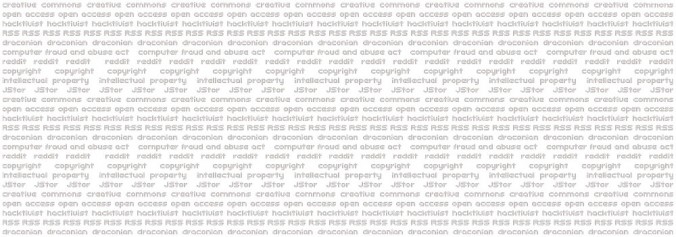“The defiance of established authority, religious and secular, social and political, as a world-wide phenomenon may well one day be accounted the outstanding event of the last decade.”
— On Civil Disobedience, Hannah Arendt (1969)
_______________________________________
“Information is power,” wrote the late Aaron Swartz in 2008. “But like all power, there are those who want to keep it for themselves.” The precocious and beloved Internet activist was keenly aware of this reality throughout his life, but he did not take it lightly. The statement was a preface to the Guerilla Open Access Manifesto he penned in 2008, an urgent call for the liberation of information that was being “locked up by publishers” behind paywalls and copyright restrictions. “It’s time to come into the light,” he urged, “and, in the grand tradition of civil disobedience, declare our opposition to this private theft of public culture.”
Swartz had closely studied the restrictions placed on the networks of information that were intended by the Internet’s designers to be free and democratizing. In the weeks following his suicide he has been rightfully eulogized as a vital actor in the fight for digital rights and open access. Although it is difficult to claim one specific cause for what brought Swartz to end his own life, friends and family confirm that he was having a hard time dealing with the prospect of spending time in jail — a real possibility considering the 13 felonies he was being accused of after downloading millions of JSTOR documents from MIT’s network. His valiant act of civil disobedience was aggressively countered by the federal government that sought to do more than just reprimand.
Consider the term used in the media to discuss Swartz and the community he belonged to: hacktivists. It is a threatening, sinister word, as Northwestern University philosophy professor Peter Ludlow wrote in the New York Times. But currently, Ludlow went on to explain, there is an effort to redefine hacking as “fundamentally about refusing to be intimidated or cowed into submission by any technology, about understanding the technology and acquiring the power to repurpose it to our individual needs, and for the good of the many.”
So in keeping with this reframing of ‘hacktivist,’ Swartz was truly committed to the mission of protecting user rights in the digital age. His run-in with the law proved that a violation of a website’s terms of service can result in harsh penalties. It’s easy to forget and not pay attention to how our day-to-day activities on the Internet are being regulated — we give away so much when we blindly agree to websites’ terms of service; terms that change quickly and at the host’s behest. It has been widely reported that prosecutors in the state of Massachusetts were clinging to the 1986 Computer Fraud and Abuse Act (CFAA) to prosecute Swartz — specifically to the section that covers anyone who “knowingly causes the transmission of a program, information, code, or command, and as a result of such conduct, intentionally causes damage without authorization, to a protected compute.” Because Swartz violated JSTOR’s terms of service, that law gave prosecutors the power to garner 13 felony counts against him.








